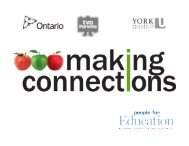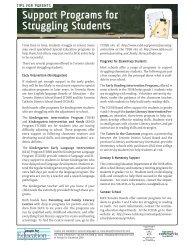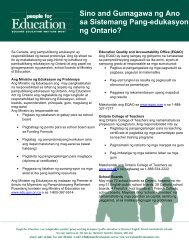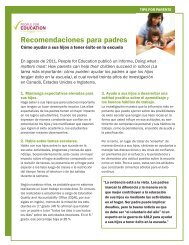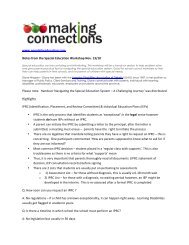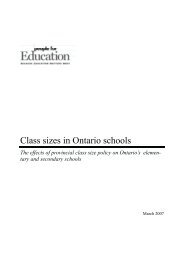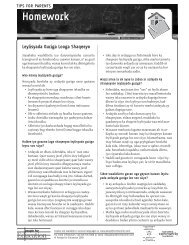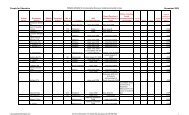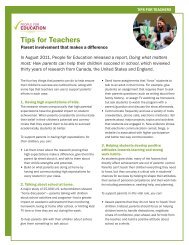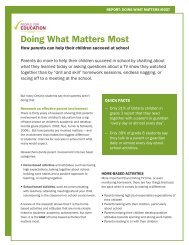Our Children Our Future Our Vision - People for Education
Our Children Our Future Our Vision - People for Education
Our Children Our Future Our Vision - People for Education
You also want an ePaper? Increase the reach of your titles
YUMPU automatically turns print PDFs into web optimized ePapers that Google loves.
<strong>Our</strong> <strong>Children</strong>, <strong>Our</strong> <strong>Future</strong>, <strong>Our</strong> <strong>Vision</strong><br />
COMMENTS: There were 62 comments in this category, which were coded under the major themes<br />
of Funding (15), Curriculum (9), Tuition Agreements (5), Resources (3), Language and Culture (2),<br />
Special <strong>Education</strong> (2), and General Comments (26).<br />
Respondents cited Funding (15) and Resources (3) as primary concerns in First Nation schools,<br />
which they noted were not comparable to schools in the provincial system, and “prevented equality”<br />
so that First Nation “students can have the same opportunity to succeed as students in provincial<br />
schools.” Respondents also commented that Curriculum (9) used in First Nation schools should<br />
“have a balance in their culture and the western culture.”<br />
4. Band Operated Funding Formula (BOFF)<br />
Q1: The current funding <strong>for</strong>mula <strong>for</strong> band operated schools is appropriate and sufficiently meets<br />
the needs of our students. In the area of funding levels and the use of the Band Operated Funding<br />
Formula <strong>for</strong> determining base funding levels, 62.8% of the respondents were in total disagreement,<br />
and 17.7% were in some disagreement with the statement, <strong>for</strong> a total of 80.5%. Only 8.4% felt that<br />
the BOFF was appropriate and sufficient to meet the needs of students.<br />
Q2: The 2% cap imposed on the funding levels in 1996 must be lifted and funding levels must accurately<br />
reflect cost of living increases and population growth. Respondents to this statement felt<br />
that the 2% cap on funding must be lifted, with 88.8% in full / overwhelmingly in agreement with<br />
the statement.<br />
Q3: Salaries, benefits and pensions <strong>for</strong> teachers in band operated schools must be comparable to<br />
provincially funded systems. Respondents were in full / overwhelmingly in agreement that teachers<br />
in First Nations schools should be comparably compensated, with 86.1% in full / overwhelmingly<br />
in agreement with the statement.<br />
COMMENTS: There were 47 comments in this category, which were coded under the major themes<br />
of Salaries (14), the Formula (14), Leadership (8), and General Comments (11).<br />
Respondents noted that Salaries (14) <strong>for</strong> First Nations teachers and staff were of primary concern,<br />
and needed to be increased in parity with the province in order to “retain high quality teachers”<br />
and to eliminate the “high staff turn-over” found on many reserves. Salaries were also seen as<br />
“the main barrier to achieving and maintaining success <strong>for</strong> band operated schools,” as well as to<br />
“encourage First Nation people to pursue a career in education.”<br />
In the area of the Formula (14), respondents commented that the <strong>for</strong>mula “creates poverty within<br />
First Nation communities,” with one respondent commenting “why are our students worth half<br />
of those in the provincial system?” There were eight (8) comments centred on Leadership, with<br />
respondents appealing to their local leaders to “fight <strong>for</strong> children and the next 7 generations,” and<br />
Chiefs of Ontario<br />
66



